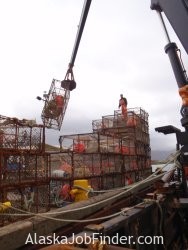A Seasoned Deck Boss Explains the Job
AlaskaJobFinder picked the brain of a long-time Alaska fishing industry veteran and deck boss. He has held many different seafood jobs with several high profile fishing industry employers in Alaska. This is only a short excerpt from our in-depth interview. Don’t miss the rest!
Access every exclusive interview and start your Alaska fishing job search
today!
Tell us a little bit about yourself.
I found out about the fishing industry while at community college. I’d finished school four months early and was reading a summerjobs handbook for college students.
It said that deckhands on crab boats would make between $15,000 and $32,000 a month.
The information said that the best way to obtain a position on a crab boat was to start on a processor then try to land a job on a crab boat that delivered to the processor.
How much experience do you have in the Alaska seafood industry?
Sixteen years.
What made you want to work in the Alaska fishing and/or seafood industry?
I liked the opportunity to make money and travel.
What related experience did you have prior to being hired?
I didn’t have any related experience in Alaska fisheries prior to being hired. I had a good work ethic and that was the only experience I had.
Tell us about the last vessel you worked on.
Before the vessel I am currently on, I worked as a deck boss and deckhand aboard a 160-foot catcher-processor going for Pacific cod. The hours were eighteen and twenty hours a day for thirty-five days straight. I also fished halibut and black cod IFQs (Individual Fishing Quota) aboard that boat. The working-deck crew for the Pacific cod season was about twenty-six people. The total number on board, including cooks and engineers, mates, and assistant engineers, was about thirty.
I also worked as a deckhand on a smaller Bering Sea catcher-processor at just over fifty-nine feet long. We caught IFQs for halibut and blackcod. The trips on that boat were fourteen-to-thirty day trips and the most people we took aboard was eleven people.
I worked on a factory trawler that was between 220-240 feet in length and had about twenty-eight to thirty-two people on board. I worked as a deckhand, the deck boss at times, and as the freezer manager.
What’s your job title?
My current title is deck boss.
Describe the job. Your responsibilities specifically.
I mainly take care of the engine room and deck. I call myself a grease monkey. I make sure that everything is working; part of that includes making visual inspections of the engine room every eight hours to make sure there are no fuel or oil leaks. I make sure that the day tank is full of fuel, that there’s no water in engine room, that there is no imminent danger and everything is operating properly.
I smell and see that there are no fuel problems. I’ll go down into the engine room on breaks and change my clothes, fill up the day tank, check bearings and zerks, and grease everything up.
I crack the whip as deck boss, making sure everything is running smooth.
I delegate jobs and train the new guys. I act as a safety officer, making sure nobody does anything stupid and everyone stays safe. Deck boss is a vague title; it’s more of a safety officer in my brain. I keep the operation is running according to the captain’s wishes and make sure everyone is safe. That’s my interpretation of deck boss. It involves keeping an eye on everyone, making sure nobody acts dumb.
What’s a typical day like on the fishing boat, if there is such a thing?
There is no typical day. It involves eighteen-plus hours worth of work and handling anything and everything weather-wise. It means working your ass off. You’re guaranteed to work at least eighteen hours every day.
What are the terms of your employment?
Percentage and time served. I adhere to a three-month contract, but I don’t always have to sign contracts.
Another term is the absolutely zero-tolerance for drugs, alcohol, violence, or anything everything on board when the boat’s at sea. We don’t mess around on the water.
How is your net pay determined?
I get a percentage of the catch.
Is it possible to land this type of job without any direct experience?
Yes, anything is possible in this industry. That’s why it’s awesome.
Why do you think you were hired?
Because I wanted to fish, and I wanted to get into the industry. I wanted to work and make money. I had a drive to succeed in the industry and capitalize on what the industry offered.
Would you recommend this line of work to others, and if so, then why?
Absolutely. I would recommend this line of work to anybody. It’s one of the few occupations that you can excel and make six figures if you’re dedicated. You do not need a formal education; it’s where hard work and being smart will pay off.
What do you and the other crew do to keep a positive attitude?
We like to go sports fishing, because then we’re doing something besides commercial fishing. To keep a good attitude I also like to look at my bank account.
Some might think it’s a male dominated industry. Tell me about opportunities for women to work on fishing boats.
There are plenty of opportunities there. It’s not easy being a woman in the industry, but there’s no reason one should not try.
AlaskaJobFinder Members Get the Whole Interview. Don’t Miss Other Topics Covered, Including:
- Proven ways to find a job and get hired
- Interviewing information
- How to survive a season on the boat
- and More.
Use AlaskaJobFinder to help your find your dream job. There are hundreds of open jobs right now. Simply click the button below to start your job search.

